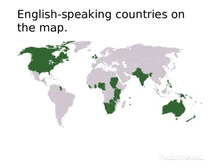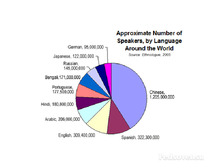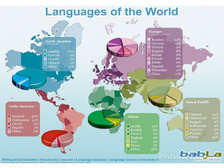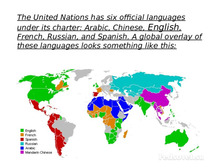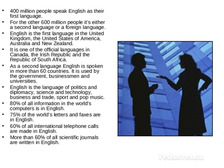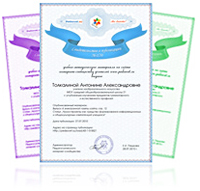Конспект урока по теме "Зачем мы учим английский язык" для 8 класса
Автор: Проценко Наталья Валентиновна
Место работы: МБОУ СОШ №2
Должность: учитель английского языка
WHY DO WE LEARN ENGLISH?
Данная разработка нацелена, прежде всего, на практику говорения по теме, она несложная по своему оформлению и достаточно эффективная в применении. На уроке отсутствуют выученные наизусть длинные монологические выступления учащихся, но на каждом этапе классной работы успешно формируются технические навыки самостоятельно строить высказывания: текст чтения рассматривается как база для совершенствования устной речи, аудирование на данном уроке также стимулирует речевую деятельность. На уроке четко прослеживается формирование универсальных учебных действий (умение анализировать данные таблиц и схем, заполнять анкеты, умение выражать своё мнение). Используется аудиозапись, раздаточный материал, презентация. Разработка составлена в соответствии с учебником: О. В. Афанасьева, И.В. Михеева. Английский язык.4-й год обучения. 8 класс. Дрофа. Москва.2008.
Цели:
1. Совершенствование навыков говорения.
2. Обучение выражению своего мнения по теме.
3. Расширение кругозора и воспитание толерантности.
STAGES
Introduction. Teacher: Good morning, I am very glad to see you. Today we are going to speak about foreign languages.
1. Warm – up activities.
Teacher: 1.Do you like to travel? 2. Would you like to visit foreign countries? 3. What countries would you like visiting?
Pupils: France, the USA, Spain, Germany, Italy, etc…
SPEAKING
2. Teacher: Work” in a chain”, asking and answering the question: What is the official language in …?
A (to B) What language is the official one in Spain?
B (to A) Spanish.
B (to C) What is the official language in France?
C (to B) French.
C (to D) What is the official language in China?
D (to C) Chinese. Etc…
LISTENING AND SPEAKING
3. Teacher: Well done. Now listen to the tape and say what their nationalities are. (Ex. 1, p. 67).
Pupils listen to the tape (twice), then say one by one:
P 1 - Samuel is Spanish P 2 – Max is Russian P 3 – Chris is French
P 4 - Martha is Norwegian P 5 – Frida is Dutch P6 – Julia is French
P7 – Nina is Russian P8 – Ann is German P9 – Swen is Norwegian
DIALOGUE
4. Teacher: Good job. To my mind everyone would like to visit Great Britain. If you have a chance, you will go to UK and in the airport Heathrow customs inspector must ask you some questions. Let us learn and act the dialogue:
Customs Inspector: Where are you from?
A: Russia
Customs Inspector: Are you travelling alone?
A: Yes, I am. I have arrived on AFS programme.
Customs Inspector: What is the purpose of your visit?
A: I want to see the country and improve my English.
Customs Inspector: Where are you going to stay?
A: In London with an English family.
Customs Inspector: Do you have anything to declare?
A: No, I do not.
Customs Inspector: Open your luggage, please.
A: Here you are.
Customs Inspector: Have a good time in Britain.
A: Thank you.
Pupils work in pairs
PRACTICE IN DISCUSSING
5. Teacher: That is right! Well, English is the most popular language in the world. Let us see the presentation.
The teacher shows the presentation (см. Приложение 2) and comments it, then starts the discussion:
Teacher: The most popular foreign language in the future will be Chinese (Spanish)
Do you agree with me?
P1- I agree with you because 900 mln people speak Chinese.
P2-In my opinion Spanish will be the most popular language because…
P3- I don’t agree with you. English will stay the global language because…
READING AND SPEAKING
6. Teacher: At home you have read the text “Different kinds of English” (Ex. 9, p.73)(см. Приложение 3). Let us prove that English has no equals.
(Pupils are divided into 2 groups.)Possible answers:
-
The first team
The second team
English is the richest in vocabulary.
It is the language of technology and science.
It is the language of sport and glamour.
English is the language of business.
English is the language of tourism.
It is the official voice of the air and the sea.
410 mln. People in the world speak English.
Three quarters of the world mail are in English.
English is a medium of 80 % information stored in the world’s computers.
The largest broadcasting companies: BBC, ABC, CNN transmit in English.
Half of scientific periodicals are in English.
Etc…
English is a working language of politicians (UNO)
Teacher: Great! Now we have 2 minutes of physical activity.
NEW WORD COMBINATIONS AND SPEAKING
7. Teacher: Now we shall try to answer the question “Why are you learning English?”
Please, practice reading the following word combinations:
(оn the blackboard)
- to study at a university
- to communicate with people from other countries
- to do business
- to understand films and songs in English
- to get a better job
- to like the language
- to want to live in an English-speaking country
- to have a subject in my curriculum
- to travel abroad
- to read books, magazines, newspapers in English
- to get any information in Internet
Pupils read the word combinations several times, then say about themselves according to the following pattern:
Example: (P1, P2, P3, P4 …)
To my mind I will need English in my future.
I want to communicate with people from other countries.
I want to get a better job in my future.
I want to travel a lot.
In my opinion I will need English to do business.
I would like to understand films and songs in English… Etc…
8. Teacher: Good job. Next lesson we shall speak about the best ways to learn English. Your homework is: to learn word combinations by heart, Ex. 21, p. 55, Ex. 11, p. 47 (in the printed exercise-book). Your marks for the lesson are… Good bye.
9. Если позволяет время, можно предложить ученикам заполнить следующую анкету. (см. Приложение 4) .
Приложение 1. Текст для аудирования:
Hello, my name is Paul Davis.
I’m a teacher at the international language school in Oxford. Our school in rather new but it is already quite popular. A lot of teenagers come here from different countries of the world. They stay in Oxford for 2 weeks. In the mornings and afternoons they have English classes and lectures on the History of Great Britain. In the evenings they have cultural visits to museums, picture galleries and historic places. I think they enjoy it. Most of them are good and motivated students and pleasant to teach.
My group has 9 students from 6 different countries. Anna, a very talented girl comes from Munich, Germany. Her English is very good but she has some problems with grammar. She has already made friends with Julia, a French girl from Lion. Julia’s English is not so good in but she is working hard. Chris is from France too. He is interested in sport. Unfortunately, he is not a very hardworking student. Max and Nina come from Russia. They are both very nice and motivated. Swen and Martha come from Norway. They are both very motivated and work well. Frida is from Holland. Samuel is Spanish. It is his third visit to Oxford. We all like him very much.
Приложение 3. Текст для чтения:
In the 16th
century the people who lived in Europe did not know
English.
They couldn't understand English words. Only those
who lived on
the island called Great Britain spoke English. En-
glish was
useless for the people of the continent. In those years
Latin,
French, German and Italian were popular and widely
known.
Four hundred years later the
speakers of English travelled into
every corner of the globe
carrying their language and culture
with them. Today English is
more important than any other lan-
guage has ever been. It has
become the language of the planet, the
first truly global
language. Of all the world's languages it is prob-
ably the
richest in vocabulary. Now it is the language of technolo-
gy
and science, business and sport. English is the official lan-
guage
of the Olympics, the official voice of the air and of the sea.
People
use English as the first language in English-speaking
countries
such as Britain, the USA, Canada, Australia and New
Zealand. It
has become the second language in countries like In-
dia,
Nigeria and Singapore. Then there is En-
glish as a foreign
language. People teach and learn English as a
foreign language
in Europe and Asia, in Africa and South Ameri-
ca, in other
words, all over the world.
But English is not the same
everywhere. Several kinds of English
have appeared. They are
American English, Canadian English,
Australian English, etc.
People who live in Britain speak British
English.
Приложение 4.
Ваша школа решила стать членом международной организации «Friends around the world». Заполните нижеследующую анкету, чтобы найти себе друга по переписке в любой стране мира.
FRIENDS AROUND THE WORLD
General information
Name:
Age:
Nationality:
Address:
Study
What are your favorite subjects at school?
What languages do you speak?
Why are you learning English?
Family
How many people are there in your family?
How many brothers or sisters do you have?
Источники материалов:
О.В. Афанасьева, И.В. Михеева. «Английский язык 4-й год обучения 8 класс» изд. Дрофа Москва 2008
В.П. Кузовлев, Н.М. Лапа и др. «Счастливый английский. Книга 4» Москва «Просвещение» 1997
Т.Б. Клементьева, Джилл Шеннон «Счастливый английский. Книга 2» Обнинск «Титул» 1996
Т.Б. Клеменьтева, Джилл Шеннон «Счастливый английский. Книга 3» Обнинск «Титул» 2001
Ресурс http://ru.wikipedia.org
На странице приведен фрагмент.
|
Автор: Проценко Наталья Валентиновна
→ ProNat |
Спасибо за Вашу оценку. Если хотите, чтобы Ваше имя
стало известно автору, войдите на сайт как пользователь
и нажмите Спасибо еще раз. Ваше имя появится на этой стрнице.
